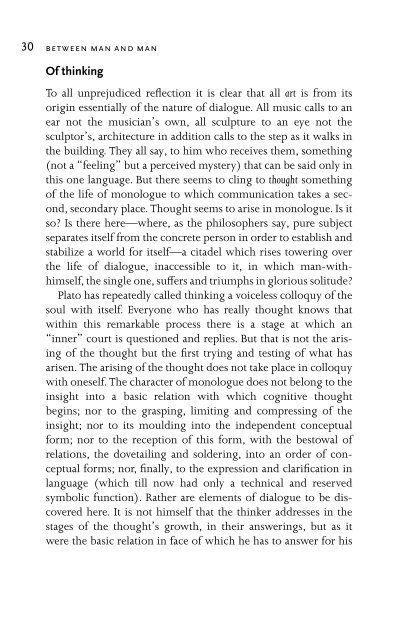- Page 2 and 3: Between Man and Man ‘Martin Buber
- Page 4 and 5: Martin Buber Between Man and Man Tr
- Page 6 and 7: CONTENTS Foreword ix Introduction b
- Page 8: contents vii II. From Aristotle to
- Page 11 and 12: x foreword There follow two address
- Page 13 and 14: xii introduction anecdotes, represe
- Page 15 and 16: xiv introduction “speechifying.
- Page 17 and 18: xvi introduction But what is the re
- Page 19 and 20: xviii introduction the student’s
- Page 21 and 22: xx introduction in Between Man and
- Page 23 and 24: 2 between man and man did not matte
- Page 25 and 26: 4 between man and man shared silenc
- Page 27 and 28: 6 between man and man these glances
- Page 29 and 30: 8 between man and man The other obj
- Page 31 and 32: 10 between man and man under discus
- Page 33 and 34: 12 between man and man I have only
- Page 35 and 36: 14 between man and man information
- Page 37 and 38: 16 between man and man illumination
- Page 39 and 40: 18 between man and man their subjec
- Page 41 and 42: 20 between man and man respond, sta
- Page 43 and 44: 22 between man and man SECTION TWO:
- Page 45 and 46: 24 between man and man become for h
- Page 47 and 48: 26 between man and man Now to our p
- Page 49: 28 between man and man myself”. F
- Page 53 and 54: 32 between man and man This referen
- Page 55 and 56: 34 between man and man know the bel
- Page 57 and 58: 36 between man and man conceded to
- Page 59 and 60: 38 between man and man authority ar
- Page 61 and 62: 40 between man and man if by anythi
- Page 63 and 64: 42 between man and man look to look
- Page 65 and 66: 44 between man and man things. Or d
- Page 67 and 68: 2 THE QUESTION TO THE SINGLE ONE (9
- Page 69 and 70: 48 between man and man that remarka
- Page 71 and 72: 50 between man and man Thou—that
- Page 73 and 74: 52 between man and man cosmologist,
- Page 75 and 76: 54 between man and man undertake th
- Page 77 and 78: 56 between man and man expressing w
- Page 79 and 80: 58 between man and man “The etern
- Page 81 and 82: 60 between man and man connecting t
- Page 83 and 84: 62 between man and man qualitative
- Page 85 and 86: 64 between man and man slackening.
- Page 87 and 88: 66 between man and man one: “Prec
- Page 89 and 90: 68 between man and man and decision
- Page 91 and 92: 70 between man and man of the happe
- Page 93 and 94: 72 between man and man being to exi
- Page 95 and 96: 74 between man and man position”.
- Page 97 and 98: 76 between man and man their test.
- Page 99 and 100: 78 between man and man the boundary
- Page 101 and 102:
80 between man and man towards him
- Page 103 and 104:
82 between man and man ground be st
- Page 105 and 106:
84 between man and man described as
- Page 107 and 108:
86 between man and man and a falsif
- Page 109 and 110:
88 between man and man direction an
- Page 111 and 112:
90 between man and man latter but t
- Page 113 and 114:
92 between man and man good and evi
- Page 115 and 116:
94 between man and man the person g
- Page 117 and 118:
96 between man and man unattainable
- Page 119 and 120:
3 EDUCATION “The development of t
- Page 121 and 122:
100 between man and man eternal pos
- Page 123 and 124:
102 between man and man point out t
- Page 125 and 126:
104 between man and man education b
- Page 127 and 128:
106 between man and man growth of t
- Page 129 and 130:
108 between man and man opposite po
- Page 131 and 132:
110 between man and man the reality
- Page 133 and 134:
112 between man and man Eros is cho
- Page 135 and 136:
114 between man and man heart of th
- Page 137 and 138:
116 between man and man with the fe
- Page 139 and 140:
118 between man and man experience
- Page 141 and 142:
120 between man and man from time t
- Page 143 and 144:
122 between man and man Spirit, tow
- Page 145 and 146:
124 between man and man Personality
- Page 147 and 148:
126 between man and man opposing in
- Page 149 and 150:
128 between man and man it. Not for
- Page 151 and 152:
130 between man and man victory’,
- Page 153 and 154:
132 between man and man Kerschenste
- Page 155 and 156:
134 between man and man important,
- Page 157 and 158:
136 between man and man very differ
- Page 159 and 160:
138 between man and man box, in the
- Page 161 and 162:
5 WHAT IS MAN? Ne connaîtrons-nous
- Page 163 and 164:
142 between man and man know? 2. Wh
- Page 165 and 166:
144 between man and man because I a
- Page 167 and 168:
146 between man and man contribute
- Page 169 and 170:
148 between man and man with him it
- Page 171 and 172:
150 between man and man II: From Ar
- Page 173 and 174:
152 between man and man can only be
- Page 175 and 176:
154 between man and man conceptual
- Page 177 and 178:
156 between man and man experienced
- Page 179 and 180:
158 between man and man Pascal’s
- Page 181 and 182:
160 between man and man at home in
- Page 183 and 184:
162 between man and man the other,
- Page 185 and 186:
164 between man and man considered
- Page 187 and 188:
166 between man and man is the thir
- Page 189 and 190:
168 between man and man naturally e
- Page 191 and 192:
170 between man and man sphere of H
- Page 193 and 194:
172 between man and man essentially
- Page 195 and 196:
174 between man and man he expresse
- Page 197 and 198:
176 between man and man just as unr
- Page 199 and 200:
178 between man and man “create
- Page 201 and 202:
180 between man and man his goal; a
- Page 203 and 204:
182 between man and man which are a
- Page 205 and 206:
184 between man and man not really
- Page 207 and 208:
186 between man and man SECTION TWO
- Page 209 and 210:
188 between man and man immensely i
- Page 211 and 212:
190 between man and man first touch
- Page 213 and 214:
192 between man and man and rejects
- Page 215 and 216:
194 between man and man existence h
- Page 217 and 218:
196 between man and man which arose
- Page 219 and 220:
198 between man and man universe wh
- Page 221 and 222:
200 between man and man man and thi
- Page 223 and 224:
202 between man and man acquire a f
- Page 225 and 226:
204 between man and man essentially
- Page 227 and 228:
206 between man and man is to be th
- Page 229 and 230:
208 between man and man 8 But is th
- Page 231 and 232:
210 between man and man We can see
- Page 233 and 234:
212 between man and man wherever it
- Page 235 and 236:
214 between man and man consecrated
- Page 237 and 238:
216 between man and man in this sit
- Page 239 and 240:
218 between man and man God is not,
- Page 241 and 242:
220 between man and man infinitely
- Page 243 and 244:
222 between man and man termed a go
- Page 245 and 246:
224 between man and man amazement i
- Page 247 and 248:
226 between man and man which the i
- Page 249 and 250:
228 between man and man the pain, p
- Page 251 and 252:
230 between man and man spoken. The
- Page 253 and 254:
232 between man and man are inadmis
- Page 255 and 256:
234 between man and man there is no
- Page 257 and 258:
236 between man and man possible on
- Page 259 and 260:
238 between man and man In individu
- Page 261 and 262:
240 between man and man slackening.
- Page 263 and 264:
242 between man and man most precis
- Page 265 and 266:
244 between man and man together sh
- Page 267 and 268:
246 translator’s notes (3)p. 25.
- Page 269 and 270:
248 translator’s notes The Ego an
- Page 271 and 272:
250 afterword language in a letter
- Page 273 and 274:
252 afterword boundless. From this
- Page 275 and 276:
254 afterword not only God but also
- Page 277 and 278:
256 afterword dialogue by Cohen, Ro
- Page 279 and 280:
258 afterword Catholic philosophy p
- Page 281 and 282:
260 afterword the new discovery by
- Page 283 and 284:
262 afterword thought only as a com
- Page 285 and 286:
264 afterword this statement I must
- Page 287 and 288:
266 index of names Heidegger, Marti
- Page 289:
268 index of subjects man, nature o



